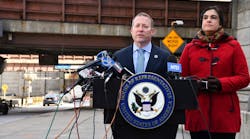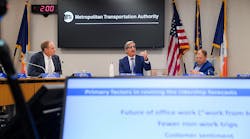FHWA issues Letter of Legal Sufficiency to MTA’s congestion pricing plan
The Federal Highway Administration (FHWA) approved the release of the Final Environmental Assessment for the New York City’s Central Business District Tolling Program (CBDTP), also known as congestion pricing , for a 30-day public notice. The Letter of Legal Sufficiency determined the CBDTP’s partners, the Metropolitan Transportation Authority (MTA), New York State Department of Transportation and New York City Department of Transportation (NYCDOT), provided all the needed documentation ahead of FHWA issuing its final decision.
"Congestion pricing is a generational opportunity to make it easier for people to get around in and get to the Central Business District by reducing traffic and funding improvements to the public transit system. To do it right, environmental equity has been an integral component. We are grateful the FHWA has acknowledged the project sponsors’ efforts to date and has found the document has met the standards for legal sufficiency," said MTA Chief External Relations John J. McCarthy.
The plan to implement CBDTP would place a toll on vehicles entering or staying in New York City’s Central Business District. The net revenues would fund improvements on New York City Transit buses and trains (80 percent of funds), Metro-North Railroad (10 percent of funds) and Long Island Rail Road (10 percent of funds).
“Our shared vision for congestion pricing will reduce traffic, improve air quality in our communities and raise critical funding for our subways and buses,” said NYCDOT Chief Communications Officer Nick Benson. “This approval marks a significant step forward, and we will continue working with our partners at the city, state and federal level to advance this nation-leading program and deliver a safer, healthier, more equitable city.”
This is the United States’ first venture into congestion pricing. Similar plans in global cities, including Stockholm, Sweden, London, UK and Singapore, have resulted in significant decreases in traffic congestion, increases in average travel speeds and, in Stockholm’s case, an increase in public transit use.
While the same benefits are anticipated with the implementation of CBDTP, a more immediate impact on New York City is the role congestion pricing will play in MTA’s 2020-2024 Capital Program , where the authority anticipates at least $15 billion to fund capital investments.
Riders Alliance Executive Director Betsy Plum called news of the FHWA’s decision “the best Friday afternoon news dump ever” and noted the case to implement the CBDTP “could not be stronger than it is today.”
Tom Wright, president and CEO of the Regional Plan Association, said, “Congestion Pricing is essential to the health and well-being of the tri-state region. Today's news—that the Federal Highway Administration sent a Letter of Legal Sufficiency to the MTA--is a great step for reducing congestion, improving the region's environment and supporting transit. We applaud the Biden Administration, the MTA and Gov. Hochul for advancing this transformative policy and look forward to implementing it in a way that benefits the entire region."
Environmental Defense Fund State Director for New York and New Jersey Mary Barber said congestion pricing is a foundational policy that will support the state’s sustainable future.
“We are pleased the federal process to approve New York City’s congestion pricing program is moving the city one step closer towards relieving traffic congestion, reducing emissions and funding essential upgrades to New York’s public transit system,” said Barber.
‘A money grab’
The praise for FHWA’s decision did not extend into New Jersey, where Gov. Phil Murphy called the decision “unfair and ill-advised” and noted the project’s forward movement without a “true environmental impact study undercuts some of the administration’s own long-term goals.”
U.S. Rep. Josh Gottheimer, who formed a caucus focused on opposing congestion pricing, called the program “MTA’s cash-grabbing Congestion Tax” and noted the Environmental Assessment estimates there will be increases in pollutants in The Bronx, Richmond and Nassau Counties in New York and Bergen County, N.J. The Environmental Assessment also says increases in truck trips and changes in traffic volumes because of implementation of CBDTP “would not result in regional or localized exceedances of National Ambient Air Quality Standards.”
The Environmental Assessment analyzed the impact of the CBDTP on traffic congestion, transit, air quality and numerous other environmental indicators in 28 counties across New York, New Jersey and Connecticut. The area contains 22 million people, including 12.3 million residents residing in environmental justice communities and five Tribal Nations.
“Since day one, I’ve stood against the disproportionate negative impacts of congestion pricing on New Jerseyans – a greater financial burden on New Jersey commuters, double tolling, toll shopping, a lack of revenue for [New Jersey Transit], outsized environmental burdens on certain North Jersey communities and financial impacts on the Port Authority’s capital budget. Everyone in the region deserves access to more reliable mass transit but placing an unjustified financial burden on the backs of hardworking New Jersey commuters is wrong. Simply put, it is a money grab,” Gov. Murphy said.
The governor continued by saying he supports congestion pricing as a concept, but that it needed to be structured in a way that is fair to all sides and pledged to continue working with officials from both states, as well as New Jersey’s congressional delegation to stop “this misguided tolling plan.” He also noted all legal options were being assessed.
FHWA is will issue its final decision on the project within the next 30 days.

Mischa Wanek-Libman | Group Editorial Director
Mischa Wanek-Libman is director of communications with Transdev North America. She has more than 20 years of experience working in the transportation industry covering construction projects, engineering challenges, transit and rail operations and best practices.
Wanek-Libman has held top editorial positions at freight rail and public transportation business-to-business publications including as editor-in-chief and editorial director of Mass Transit from 2018-2024. She has been recognized for editorial excellence through her individual work, as well as for collaborative content.
She is an active member of the American Public Transportation Association's Marketing and Communications Committee and served 14 years as a Board Observer on the National Railroad Construction and Maintenance Association (NRC) Board of Directors.
She is a graduate of Drake University in Des Moines, Iowa, where she earned a Bachelor of Arts degree in Journalism and Mass Communication.






